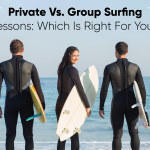The sun-kissed shores of Waikiki beckon adventure seekers and water enthusiasts from around the globe. Among the array of water activities available, stand-up paddleboarding, or SUP, has seen a surge in popularity. If you are considering exploring the serene waters of Waikiki on a paddleboard, ensuring safety should be critical. Before heading out with your SUP rentals in Waikiki, understanding specific safety considerations can make your experience both thrilling and safe.
Why Waikiki is a SUP Haven
Waikiki, with its calm turquoise waters and scenic backdrop, is an ideal location for both novice and seasoned paddleboarders. The gentle waves and extensive coastline provide ample opportunities for exploration and recreation. Whether you’re keen on stand–up paddleboarding for relaxation or adding a tinge of surfing thrill to it, Waikiki caters to all.
Key Safety Considerations for SUP Rentals
- Choose a Reputable Rental Company: It is essential to rent your SUP equipment from a trusted and reputable company in Waikiki. They should maintain their equipment well, ensuring that the boards and paddles are in good condition.
- Get the Right Equipment: Ensure that the board you rent is suitable for your skill level. Beginners should opt for wider, more stable boards, while experienced paddleboarders might prefer something more agile.
- Prioritize Personal Floatation Devices (PFDs): While the waters of Waikiki are generally calm, unexpected situations can arise. Wearing a PFD can be a lifesaver, especially if you are venturing farther from the shore.
- Leash It Up: A SUP leash connects you to your board, ensuring that even if you fall off, your board remains within reach. This is especially crucial in deeper waters or when the current is strong.
Understanding Waikiki’s Waters
- Be Aware of the Tides and Currents: Waikiki’s waters can sometimes have strong tides and currents. Being aware of these and planning your SUP adventure during favorable conditions can enhance safety.
- Respect Certain Areas: Certain areas in Waikiki are typically used for specific water activities such as surfing or canoeing. Look around and ensure you are paddleboarding in an area away from surfers or swimmers to avoid collisions.
- Understand the Marine Life: Considering the diverse array of marine life in Hawaii, it’s important to be aware of what is underneath you such as coral reef. Steer clear from areas known for jellyfish or other marine creatures that can pose a threat.
Enhancing Your SUP Experience Safely
- Opt for Guided Tours: If you are new to Waikiki or stand-up paddleboarding, consider joining a guided tour. Expert guides can provide valuable insights about the best spots, currents, and potential hazards.
- Stay Hydrated and Protected: The tropical sun in Waikiki can be intense. Ensure you have sunscreen applied, wear protective clothing, and stay hydrated throughout your paddleboarding session.
- Know Your Limits: While exploring Waikiki’s waters can be exhilarating, it is essential to know your physical limits. If you feel fatigued or unsure about a particular area, it is best to return to the shore or seek guidance.
Preparing Yourself: Pre-SUP Considerations
Just as you would prepare for any adventure, stand-up paddleboarding in Waikiki requires its own set of preparations. Going beyond the equipment and local conditions, one must ensure they are mentally and physically ready for the experience.
- Physical Fitness and SUP: Stand-up paddleboarding, while serene, can be a demanding activity. Building core strength, enhancing balance, and improving cardiovascular fitness can all contribute to a better SUP experience. If you are new to the sport, consider some preparatory exercises before diving in.
- Take a Lesson: Before venturing into the waters, consider taking a basic SUP lesson. Even if you are familiar with paddleboarding, a quick refresher course tailored to Waikiki’s conditions can be invaluable.
- Mental Preparedness: The vastness of the ocean and the physical demands of paddleboarding can sometimes be overwhelming. Mental preparation, understanding that challenges might arise, and being ready to face them can make a significant difference. Practicing relaxation techniques or basic meditation can aid in staying calm during unforeseen circumstances.
Considerations for Group SUP Activities
Waikiki often attracts groups — families, friends, or corporate teams — who wish to explore SUP together. There are added considerations when paddleboarding as a group.
- Stick Together: In the expansive waters of Waikiki, it is easy for group members to drift apart. Establish a rule to remain within a certain distance of each other to ensure safety and cohesion.
- Establish Communication Signals: Verbal communication can be challenging over distances or with the sound of waves. Develop hand signals or whistle codes to communicate essential messages like “return to shore,” “all okay,” or “need assistance.”
- Rent from the Same Vendor: To ensure uniformity in equipment quality and safety standards, it is beneficial for groups to rent their SUP equipment from the same vendor.
Long-term Rentals and Care
If your stay in Waikiki is extended, you might consider long-term SUP rentals. This brings in additional safety and care aspects.
- Storage Safety: Ensure you have a safe place to store the paddleboard, away from direct sunlight and potential damage. Many hotels can provide storage solutions or can recommend local facilities.
- Regular Equipment Checks: When using the SUP board for an extended period, it is crucial to regularly inspect it for any wear and tear. Check for dings, cracks, or any damage that might compromise safety.
- Build a Relationship with the Vendor: If you are renting long-term, establish a rapport with your rental vendor. They can provide insights into local SUP events and safety updates. They might even offer guidance on the best paddleboarding spots based on the season and your skill level.
Being Respectful of Local Customs and Environment
- Understanding Local Etiquette: Every region has its unwritten rules when it comes to water activities. Engage with local paddleboarders or consult your rental vendor to understand Waikiki’s SUP etiquette. This might include right-of-way rules, areas to avoid, or the ideal times to paddle.
- Environmental Responsibility: Waikiki’s marine ecosystem is rich and diverse. Paddleboarders should avoid areas populated by marine life or where there are coral reefs. Anchor responsibly, ensuring that you do not damage the seabed or disturb the aquatic life.
- Waste Management: Ensure that you do not leave any trash behind. Carry a small waterproof bag with you to store any waste, especially if you are planning to have snacks or drinks during your SUP adventure.
Safety in Numbers: Group Paddleboarding
Paddleboarding with friends or family can not only be more enjoyable but also safer.
- Buddy System: Always have a designated buddy when paddleboarding in a group. This ensures that someone is always aware of your location and can raise an alarm if needed.
- Group Dynamics: Ensure that the group’s skill level is relatively consistent. If there are beginners in the group, consider sticking to calmer waters, and make sure experienced paddleboarders keep an eye on them.
- Joint Planning: Before heading out, have a group meeting to discuss the route, rest points, and emergency procedures. A well-coordinated plan ensures that everyone is on the same page, enhancing the group’s safety.
The Balance Between Adventure and Safety
Stand-up paddleboarding in Waikiki offers an unparalleled experience, combining the allure of the open ocean with the thrill of navigating it on a board. However, the real joy of this adventure lies in striking a balance between the call of the ocean and the importance of safety. By understanding the local conditions, respecting the environment, being prepared for emergencies, and fostering a sense of community among fellow paddleboarders, you ensure that your SUP experience in Waikiki is not only exhilarating but also safe and responsible.



